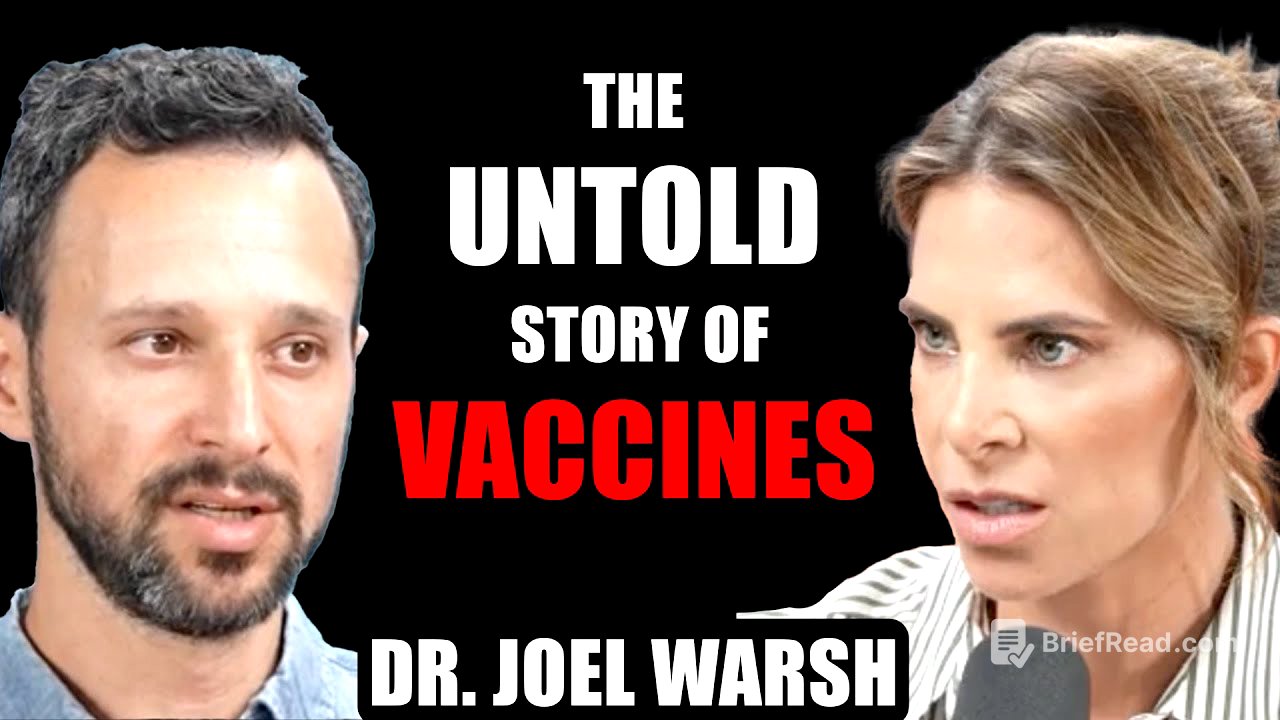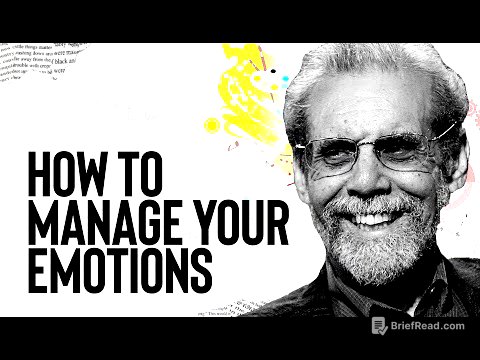TLDR;
This episode of "Keeping It Real with Jillian Michaels" features Dr. Joel Warsh, who discusses his book, "Between a Shot and a Hard Place," which tackles difficult vaccine questions with balanced data and clarity. The conversation explores vaccine safety, public health messaging, autism, autoimmune conditions, and the rise in chronic illness in children. Key points include the importance of informed consent, the need for unbiased research, and the complexities of vaccine safety testing and potential long-term effects.
- The conversation highlights the need for open discussions about vaccines, addressing concerns about forced vaccinations, herd immunity, and potential risks.
- The discussion underscores the importance of unbiased research and the need for open dialogue between different viewpoints to ensure the safest possible vaccines.
- The episode emphasizes the importance of individual variability and the need for tailored approaches to vaccination, considering factors like genetics, age, and overall health.
Introduction [0:00]
Jillian Michaels introduces Dr. Joel Warsh, a board-certified pediatrician and author of "Between a Shot and a Hard Place." The episode aims to break down the science behind vaccine safety, address issues with public health messaging, and explore research related to autism, autoimmune conditions, and chronic illnesses in children. The goal is to provide parents with a comprehensive understanding of these complex issues.
Dr. Warsh's Background and Motivation [1:24]
Dr. Warsh explains that he is an integrative pediatrician in Los Angeles with a master's in epidemiology. He wrote the book due to his frustration with the censored nature of vaccine discussions and the lack of answers for parents' questions. He emphasizes that he is not anti-vaccine but believes in informed consent and open debate about vaccine schedules and concerns.
The Issue of Forced Vaccinations [3:13]
Jillian Michaels raises the issue of forced vaccinations, questioning the logic behind mandates when individuals can still contract illnesses despite being vaccinated. Dr. Warsh responds that he doesn't believe in forcing people to get vaccines and that any such decision should involve strict criteria and oversight. He argues that the role of doctors is to teach and inform, not to force, and that the CDC schedule is a recommendation, not a mandate.
Herd Immunity and Social Contract [7:21]
The discussion shifts to herd immunity and the social contract of protecting vulnerable populations. Dr. Warsh explains that while herd immunity is important for diseases like measles, the conversation becomes nuanced when considering the increasing number of vaccines and individual ethical standards. He highlights the difficulty in determining how much personal burden one should bear to protect others.
Cause for Concern and Cumulative Risk [10:02]
Michaels asks if there is cause for concern regarding the increasing number of vaccines. Dr. Warsh responds that there is growing cause for concern due to the lack of understanding of cumulative and long-term risks. He notes the divide between the medical community, which emphasizes the benefits of vaccines, and parents, who worry about potential links to autism, autoimmune conditions, and asthma.
Defining Vaccine Injury and Cost-Benefit Analysis [12:10]
The conversation addresses the cost-benefit analysis of vaccines and what constitutes a vaccine injury. Dr. Warsh explains that a mild reaction involves typical immune responses like fever and soreness, while severe reactions can include death, encephalitis, seizures, and myocarditis. He points out that there is no clear definition of a vaccine reaction, and reporting is voluntary.
Long-Term Risks and Parental Concerns [15:16]
Dr. Warsh addresses parental concerns about the long-term risks of vaccines, such as asthma, allergies, autoimmune conditions, and autism. He notes that doctors often focus on preventing acute diseases, while parents are more concerned about chronic conditions. He emphasizes that improved sanitation and nutrition, along with vaccines, have reduced the prevalence of many diseases.
Safety Testing and Placebo Controls [17:36]
The discussion moves to safety testing, particularly the use of placebo controls. Dr. Warsh clarifies that while all vaccines undergo safety testing before being marketed, most childhood vaccines have not been tested against inert placebos. Instead, they are often tested against other vaccines or earlier versions, which raises questions about relative safety.
Vaccine Technologies and Adjuvants [21:57]
Dr. Warsh explains different vaccine technologies, including killed diseases, protein parts, and mRNA. He discusses the role of adjuvants like aluminum, which are added to stimulate a stronger immune response, particularly for protein-based vaccines. He notes that while adjuvants are effective, there are concerns about their potential long-term effects, especially in vulnerable children.
Aluminum in Vaccines and Cumulative Effects [25:43]
The conversation addresses the use of aluminum in vaccines, with Dr. Warsh noting that while the standard medical community considers the doses very small and safe, injecting aluminum is different from ingesting it. He raises concerns about the cumulative effect of multiple vaccines containing aluminum, especially in children with genetic predispositions or detoxification issues.
Unbiased Research and Conflicting Studies [28:56]
Dr. Warsh emphasizes the need for unbiased research on vaccine safety, noting that much of the existing research is funded by pro-vaccine or anti-vaccine groups, leading to conflicting results. He calls for open debate and discussion between experts with differing viewpoints to move forward and ensure the healthiest outcomes for children.
Vulnerability of Developing Bodies [30:08]
The discussion explores the vulnerability of developing bodies to toxins and adjuvants. Dr. Warsh agrees that younger children with less developed immune systems and detoxification capabilities may be more susceptible to negative impacts from vaccines. He reiterates the importance of weighing risks versus benefits and conducting long-term studies to assess potential long-term effects.
Studying Vaccinated vs. Unvaccinated Populations [32:21]
Dr. Warsh suggests studying vaccinated versus unvaccinated children to assess long-term health outcomes, including cancer and autoimmune conditions. He acknowledges potential biases but argues that such studies could provide valuable information and increase parental confidence in vaccines if the results are reassuring.
Other Ingredients in Vaccines [34:23]
The conversation shifts to other ingredients in vaccines, including formaldehyde, inactivators, and buffers. Dr. Warsh mentions concerns about the use of human aborted fetal tissue for growing some vaccines, as well as ethical considerations for vegans due to the use of porcine gelatin in certain products.
Individual Variability and Cumulative Risk [35:57]
Dr. Warsh emphasizes the importance of individual variability, noting that even small amounts of certain ingredients could be problematic for some people. He highlights the cumulative risk of multiple vaccines and the potential for compounding effects, especially with the addition of new vaccines each year.
Number of Vaccines and Combo Shots [36:32]
The discussion addresses the number of vaccines recommended for children, clarifying that while the number of shots may seem high, combo shots can reduce the number of pokes. Dr. Warsh acknowledges that the sheer number of vaccines can be concerning for parents and emphasizes the need for open discussions about the schedule.
mRNA Technology and Emergency Use [38:27]
The conversation turns to mRNA technology, with Michaels expressing skepticism about its rapid development and deployment. Dr. Warsh acknowledges the differing viewpoints on mRNA vaccines and emphasizes the importance of honesty and transparency during emergencies. He argues that censoring debate and demonizing alternative treatments erodes trust in medicine.
Mainstream Medicine vs. Alternative Viewpoints [42:42]
Dr. Warsh discusses the divide between mainstream medicine and alternative viewpoints, noting that mainstream science often shuts down debate and dismisses concerns as "anti-vax." He calls for engagement and discussion between experts with differing opinions to address concerns and move forward.
Myocarditis and Fertility Concerns [48:37]
The conversation addresses specific concerns related to the COVID-19 vaccine, including myocarditis and fertility issues. Dr. Warsh acknowledges that myocarditis is a known side effect and that some individuals have reported menstrual cycle changes and other issues. He emphasizes the difficulty in knowing who to listen to due to conflicting research and the lack of engagement from mainstream science.
The Need for Debate and Unified Messaging [50:41]
Dr. Warsh stresses the need for debate and unified messaging from health organizations. He points out that conflicting statements from different agencies erode trust in medicine and that experts must engage in open discussions to address concerns and provide clear guidance.
Autism and Vaccine Research [51:57]
The discussion addresses the link between vaccines and autism, with Dr. Warsh stating that the issue has not been robustly tested beyond MMR and thimerosal. He notes the alarming rise in autism rates and the lack of comprehensive research on other vaccines. He emphasizes that it is essential to investigate potential links and not dismiss parental concerns.
Rising Autism Rates and Diagnostic Changes [52:41]
Dr. Warsh acknowledges that the rise in autism rates may be partly due to increased awareness and changes in diagnostic criteria. However, he argues that the increase is too significant to be solely attributed to these factors and that there is a need to investigate potential environmental and genetic factors.
Lack of Robust Research on Autism and Vaccines [55:21]
Dr. Warsh expresses shock at the lack of robust research on the link between vaccines and autism, noting that most studies focus on MMR and thimerosal. He emphasizes that there is no comprehensive research on other vaccines and that the claim that the link has been debunked is misleading.
Parental Experiences and Gaslighting [58:25]
Dr. Warsh highlights the experiences of parents who report that their children changed after receiving vaccines. He argues that these stories should be taken seriously and investigated, rather than dismissed as anecdotal or anti-vaccine sentiment.
Variations in Vaccine Reactions Among Populations [1:01:02]
The conversation explores differences in vaccine reactions among various populations, such as young boys being more prone to myocarditis. Dr. Warsh suggests that genetic variability and cultural differences may play a role and that it is important to study these variations to tailor vaccine schedules and minimize risks.
One-Size-Fits-All Approach and the Need for Personalized Medicine [1:05:59]
Dr. Warsh criticizes the one-size-fits-all approach to vaccination, arguing that it is essential to consider individual genetics, health conditions, and other factors. He calls for the use of new technologies and AI to personalize vaccine schedules and minimize risks.
Restoring Trust in Medicine [1:06:52]
Dr. Warsh emphasizes the importance of restoring trust in medicine by prioritizing safety, engaging in open conversations, and working together to make vaccines as safe as possible. He notes that public trust in doctors and health agencies has declined significantly and that open dialogue is essential to rebuild confidence.
Fluoride and Other Environmental Toxins [1:08:44]
The discussion touches on other environmental toxins, such as fluoride, and their potential impact on health. Dr. Warsh notes that healthcare is often slow to change and that it is essential to question assumptions and conduct independent research.
Efficacy of Vaccines and Risk-Benefit Analysis [1:11:20]
Dr. Warsh addresses the efficacy of vaccines, stating that while most vaccines do work to some degree, the key question is at what cost. He emphasizes the importance of weighing the risks and benefits of each vaccine and considering individual circumstances.
Long-Term Side Effects and the Gray Area of Vaccine Safety [1:14:50]
Dr. Warsh reiterates the lack of understanding of long-term side effects from vaccines and the need for more robust safety research. He emphasizes that vaccine safety is not a black-and-white issue and that open discussions are essential to address concerns and move forward.
The Importance of Open Discussion and Moving Forward [1:16:18]
Dr. Warsh emphasizes the importance of open discussion and moving forward, stating that it is essential to acknowledge what we don't know and to conduct more research. He calls for an end to scare tactics and for a focus on what actually works to promote health.
Common Sense and a Holistic Approach to Health [1:23:56]
The conversation concludes with a call for common sense and a holistic approach to health, emphasizing the importance of diet, lifestyle, and environmental factors. Dr. Warsh encourages people to join forces and work together to promote health, rather than engaging in divisive arguments.
Conclusion and Where to Find Dr. Warsh [1:27:22]
Jillian Michaels thanks Dr. Warsh for the conversation and provides information on where to purchase his book and find him online.









